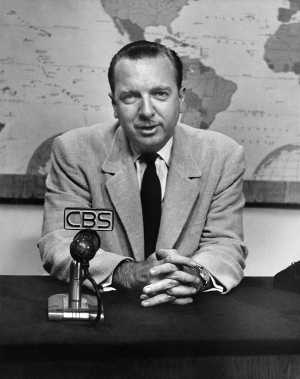 SKC Films Library SKC Films Library |
|||
|
|
|||
| SKC Films Library >> Linguistics, Languages, and Literatures >> Journalism >> United States | |||
 Walter Cronkite Walter Cronkitetelevision news anchor known for the phrase "And that's the way it is" Walter Leland Cronkite, Jr., was born in St. Joseph, Missouri, on November 4, 1916, and grew up in Houston, Texas, after age ten. His first journalism experience came from working on the newspapers of both Lanier Junior High School and San Jacinto High School. He began studying political science at the University of Texas in 1933, but dropped out in 1935 to pursue a journalism career. Between 1935 and 1939, Cronkite worked for the Houston Post, KCMO radio in Kansas City (doing the news and sports), WKY radio in Oklahoma City (as a football announcer), and United Press in its Austin, Kansas City, and El Paso bureaus. As an overseas correspondent for United Press during World War II, Cronkite reported on the German bombings of London, the invasion of North Africa, and the D-Day landings, and even flew in bombing raids over Germany. After the war, he reopened the United Press bureaus in Amsterdam and Brussels, served as the chief United Press correspondent at the Nuremberg Trials, and served as the United Press bureau manager in Moscow. Upon returning to the United States in 1949, Cronkite worked as a Washington-based news correspondent for Midwestern radio stations until Edward R. Murrow hired him to be the news correspondent WTOP-TV, the CBS affiliate in Washington, D.C. He first gained national recognition in 1952, when he anchored CBS News' coverage of the Republican National Convention in Chicago. He went on to narrate and host a number of CBS television news shows, including "You Are There," "Eyewitness to History," and "The Twentieth Century." He also served as anchor and reporter for "CBS Reports." In 1960 he anchored the first ever network broadcast of the Olympics, the Winter Games in Squaw Valley, California. On April 16, 1962, Cronkite replaced Douglas Edwards as anchor and managing editor of the "CBS Evening News." The program expanded from 15 to 30 minutes on September 2, 1963, making Cronkite the anchor of American network television's first nightly half-hour news program. His announcement of President John F. Kennedy's assassination on November 22, 1963 is the one most remembered by Americans. He went on to cover many more major historic events, including the assassinations of Robert F. Kennedy and Martin Luther King, Jr., civil rights marches and battles, all six manned missions to the Moon, the Watergate Affair, and the Iran Hostage Crisis. In 1968 he went to Vietnam in order to report on the aftermath of the Tet Offensive. One of the few times Cronkite ever offered a personal opinion during a news broadcast, his report included a comment that the United States was fighting a war it couldn't win. Named "the most trusted man in America" in a 1972 public opinion poll, Cronkite ended every one of his newscasts with the iconic phrase "And that's the way it is on (the date of broadcast)." Cronkite anchored his last newscast on March 6, 1981. Rather than retire, however, he went on to host numerous documentaries for PBS and various cable networks, including Cronkite Remembers (1997), a miniseries chronicling the historic occasions on which he had reported. He also contributed essays to National Public Radio's "All Things Considered," occasionally served as a special correspondent for CBS News, and wrote several books, including A Reporter's Life (1996) and Around America (2001). In addition to the honor bestowed on him in 1972, Cronkite was the recipient of a Peabody Award, the William Allen White Award for Journalistic Merit, an Emmy Award from the Academy of Television Arts and Sciences, the George Polk Award and a Gold Medal Award from the International Radio and Television Society, and the Presidential Medal of Freedom. Walter Cronkite died in New York City on July 17, 2009. He is buried next to his wife Mary Elizabeth (who had preceded him in death) in a family cemetery plot in Kansas City, Missouri.
|
|||
| SKC Films Library >> Linguistics,
Languages, and Literatures
>> Journalism >> United States This page was last updated on 04/14/2017. |